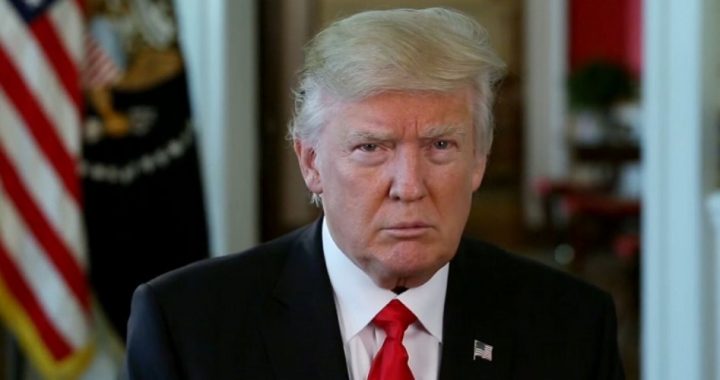
Candidate Donald Trump repeatedly promised that he would, if elected president, withdraw from the Paris Agreement agreed to under the previous administration in 2015. He said, “We are going to cancel the Paris climate agreement [and] stop all payments of the United States tax dollars to U.N. global warming programs.”
Under that agreement (not a treaty which then-President Obama claimed wouldn’t need Senate ratification), so-called global warming would be limited by slashing carbon dioxide and other emissions from the burning of fossil fuels and concentrating instead on green energy development.
One sign that Trump intends to keep his promise followed the official dispatch from the G7 Summit in Sicily on Friday: He didn’t endorse it. While France, Japan, Germany, Italy, the UK, Canada, and the presidents of the European Council and the European Commission all reaffirmed their commitment to the agreement, Trump said the United States “is in the process of reviewing its policies on climate change and on the Paris Agreement and thus is not in a position to join the consensus on these topics.”
Some are taking this as a waffle on the part of the president, setting the stage for a mealy-worded support for the agreement to be issued later this week. Others are seeing it as an opportunity to change the president’s mind altogether. Myron Ebell, director of the Center for Energy and Environment at the Competitive Enterprise Institute, told the Daily Signal that, to some big energy producers, staying in the agreement would be politically expedient: “BP [British Petroleum] and Shell are European companies and it’s impossible to do business in Europe without toeing the political line.” Others, according to Ebell, see an opportunity to game the system. Said Ebell, for big oil, “the only way to get the price of gas back up is to kill big coal. The Paris Agreement kills fossil fuels, but it kills coal first.”
Surprisingly, coal producers told White House officials that remaining in the Paris Agreement would ultimately be good for them too because “it would give U.S. negotiators a chance to advocate for coal in the future of the global energy mix.”
Katie Tubb of the Heritage Foundation explained how that gaming works in favor of big companies:
Big business and big government often go hand-in-hand. Big businesses generally can absorb and adapt to the costs of complying with burdensome regulation, of which Paris is a wellspring.
Smaller companies have a much harder time complying, which means less competition for big business. This is especially true if big business can influence the substance of regulations to favor themselves or freeze out competitors.
Many of those big companies urged President Trump to stay in. In a letter published by the compliant New York Times, Apple, Facebook, Google, Hewlett Packard, Intel, Microsoft, Morgan Stanley, Unilever, and others all joined in explaining to the president the “benefits” of continuing the Paris Agreement:
The agreement ensures a more balanced global effort [to combat global warming], reducing the risk of competitive imbalances for U.S. companies….
By expanding markets for innovative clean technologies, the agreement generates jobs and economic growth….
By strengthening global action over time, the agreement will reduce future climate impacts.
The letter baldly admitted that the real motivation behind staying in the agreement was maintaining their competitive advantage through government force:
U.S. business is best served by a stable and practical framework facilitating an effective and balanced global response. The Paris Agreement provides such a framework. As other countries invest in advanced technologies and move forward with the Paris Agreement, we believe the United States can best exercise global leadership and advance U.S. interests by remaining a full partner in this vital global effort.
And government force is what’s presently missing from the Paris Agreement, a remedy that must be fixed for it to be effective. As the globalist think tank World Pensions Council clearly indicated, the agreement currently is “predicated upon an assumption: that member states … will somehow drive down their carbon pollution voluntarily … without any binding enforcement mechanism … and without any specific penalty or fiscal pressure (for example, a carbon tax) to discourage bad behavior.”
With the United States remaining on board, the Paris Agreement can be beefed up, to the benefit of big companies itching to provide the products and services that will be needed to comply with the agreement that would now have teeth.
Fred Palmer, senior fellow for energy and climate at the conservative Heartland Institute, said: “Follow the money. These are companies that want to game the system of using [carbon dioxide] as a currency to make money.”
The biggest supporter of the Paris Agreement, however, comes from one of Trump’s top advisers: Gary Cohn. Cohn, a registered Democrat and former Goldman Sachs COO who supported Hillary Clinton financially during her 2008 presidential run but failed to give a single dollar to the Trump campaign last year, is taking advantage of his position as Trump’s chief economic adviser to turn him away from his campaign promises. As a former Trump transition official told Hunter Walker at Yahoo News: “Everybody who wants to sort of modulate and moderate the president sees Gary as the best conduit to do that because he makes no apologies for who he is: a Goldman Sachs liberal Democrat from New York.”
Sam Nunberg, a conservative consultant in the early days of Trump’s campaign, told Walker that “Gary Cohn would be too liberal for the Obama administration! I don’t know what he’s doing in a Republican White House.”
What he’s doing is turning Trump. Following Trump’s waffle after the G7 meeting, Cohn told reporters:
I think [President Trump] learned how important it is that the United States shows leadership. That was a big topic where many of the European leaders talked about these global agreements…. Without the United States it’s sort of missing a big gap when you take the biggest economy out.
He digested that. That was a meaningful moment for him.
And then Cohn added that on the Paris Agreement “his [Trump’s] views are evolving.”
An Ivy League graduate and former investment advisor, Bob is a regular contributor to The New American magazine and blogs frequently at LightFromTheRight.com, primarily on economics and politics. He can be reached at [email protected].



